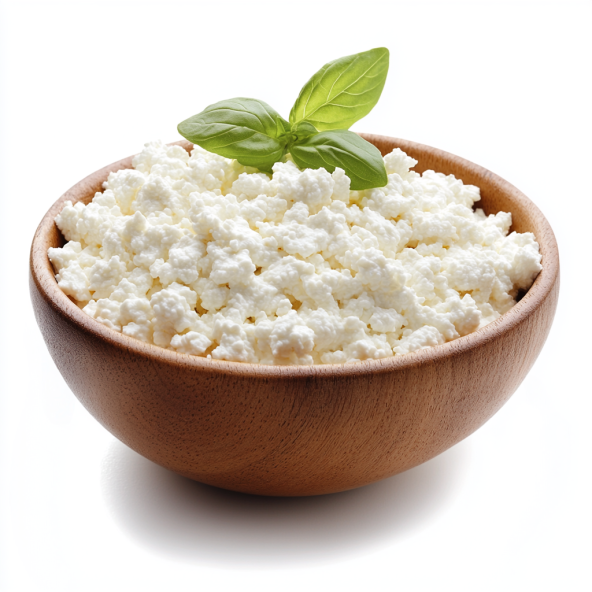How Many Times a Week Should You Eat Cottage Cheese?
Cottage cheese is a nutritious and versatile food that provides several health benefits. But, how many times a week should you eat cottage cheese to reap its rewards without overdoing it? In this article, we’ll explore the optimal frequency for consuming cottage cheese based on your individual needs, along with its health benefits and potential risks.
Introduction to Cottage Cheese
Cottage cheese is a fresh cheese made by curdling milk, then draining the liquid whey. It has been a staple in many cultures for centuries. Traditionally, it was a popular choice for rural communities, as it was easy to make and provided a good source of protein.
Today, cottage cheese is commonly found in a variety of dishes and diets around the world. Its mild taste and adaptable texture make it a popular choice for both savory and sweet dishes. Whether in a salad, spread on toast, or as part of a protein-packed snack, cottage cheese remains a key ingredient in a balanced diet.
Historical and Cultural Significance of Cottage Cheese
Cottage cheese has deep roots in various cultures worldwide. It has been a staple food in Eastern Europe for centuries. The Slavic and Nordic regions, in particular, have a long history of incorporating it into their culinary traditions. Similarly, cottage cheese was widely consumed by farmers and rural populations in the United States, especially during the 19th and early 20th centuries.
As time passed, cottage cheese found its way into mainstream diets, largely due to its affordability, nutritional value, and ease of production. Today, it is consumed globally, often touted for its high-protein content and low-fat options.
Nutritional Profile of Cottage Cheese
Cottage cheese is a nutritional powerhouse. It provides an excellent source of protein, calcium, and several essential vitamins and minerals. Here’s a breakdown of the key nutrients in a typical serving (1/2 cup) of low-fat cottage cheese:
- Protein: Around 11 grams, supporting muscle growth and repair.
- Calcium: Important for bone health and teeth strength.
- Phosphorus: Works with calcium for healthy bones and energy production.
- B Vitamins: Helps support metabolism and energy levels.
This makes cottage cheese a fantastic option for those looking to increase their protein intake without consuming excess fats or calories.
Health Benefits of Eating Cottage Cheese
Cottage cheese is packed with health benefits, making it a great addition to any diet. Below are some of the primary benefits:

Supports Muscle Growth
One of the key benefits of cottage cheese is its high protein content. This protein is mainly casein, a slow-digesting protein that is ideal for muscle growth and recovery. By incorporating cottage cheese into your diet, especially after workouts, you can promote better muscle repair and prevent muscle breakdown.
- Tip: A serving of cottage cheese after exercise can enhance recovery by providing a steady release of amino acids.
Aids in Weight Management
Cottage cheese is low in calories yet high in protein, making it an excellent choice for those looking to manage their weight. The high protein content helps promote feelings of fullness, reducing the likelihood of overeating throughout the day.
- A small serving of cottage cheese as a snack can curb hunger between meals, helping you stay on track with your weight loss goals.
Improves Bone Health
Due to its high calcium and phosphorus content, cottage cheese is a great food for supporting bone health. These minerals are essential for building and maintaining strong bones and teeth, making cottage cheese an important part of a bone-healthy diet, especially as you age.
- For better results, pair cottage cheese with other calcium-rich foods, such as leafy greens or fortified plant-based milk.
Recommended Frequency of Cottage Cheese Consumption
Factors to Consider (Age, Activity Level, Dietary Goals)
When deciding how many times a week should you eat cottage cheese, several factors come into play. Your age, activity level, and specific dietary goals can influence how much cottage cheese is appropriate for you.
- Age: Older adults may benefit from more cottage cheese due to its high calcium content, which helps maintain bone health.
- Activity Level: Active individuals, particularly those engaged in strength training, may consume cottage cheese more frequently to support muscle recovery.
- Dietary Goals: If you’re aiming to lose weight or build muscle, incorporating cottage cheese into your meals can help you meet those goals, thanks to its high protein content.
General Guidelines
Generally, eating cottage cheese 2-4 times a week is a good balance for most people. This frequency allows you to reap the health benefits of this nutrient-dense food without overconsuming it. For those with specific dietary goals, you may want to increase this frequency slightly, especially if you require more protein in your diet.
Risks of Overconsumption
While cottage cheese is highly nutritious, there are potential risks associated with eating it too often.
Lactose Intolerance and Digestion
For individuals with lactose intolerance, consuming cottage cheese in excess may cause digestive issues such as bloating or stomach cramps. While cottage cheese typically contains less lactose than other dairy products, those with severe intolerance should consume it in moderation or choose lactose-free varieties.
- If you’re lactose intolerant, start with small amounts to gauge your tolerance level.
Sodium Concerns
Some varieties of cottage cheese, particularly regular and processed options, can be high in sodium. Excessive sodium intake can lead to high blood pressure and other cardiovascular issues. If you’re concerned about sodium, opt for low-sodium cottage cheese or use it sparingly in your meals.
- Tip: Always check the nutrition label to ensure you’re not consuming excessive sodium.
Cottage Cheese in a Balanced Diet
Cottage cheese can be a valuable part of a balanced diet when consumed in moderation. It pairs well with a variety of foods, including fruits, vegetables, and whole grains. By incorporating cottage cheese into your meals, you can enhance your protein intake while enjoying its creamy texture.Discover more ways to enjoy it in What Can I Mix with Cottage Cheese?.
- Add cottage cheese to salads, smoothies, or as a topping for whole-grain toast for a nutrient-packed meal.
- Combine with avocado or nuts for a satisfying snack.
When planning your diet, ensure that cottage cheese is just one part of a broader, well-rounded eating plan that includes a variety of other nutrient-rich foods.
Role in Different Meal Plans (e.g., Keto, Vegetarian)
Cottage cheese is a fantastic addition to various meal plans, including keto and vegetarian diets.
- Keto Diet: Cottage cheese fits perfectly into the keto lifestyle due to its low-carb and high-protein profile. Since it’s low in carbohydrates and rich in healthy fats, it helps maintain ketosis, making it an ideal option for keto followers.
- Vegetarian Diet: For vegetarians, cottage cheese serves as an excellent source of protein and calcium, especially in plant-based diets where other protein sources like meat or fish are absent. It can easily be added to salads, wraps, or baked dishes.
When considering how many times a week should you eat cottage cheese, both keto and vegetarian dieters can consume it regularly as part of their balanced meals.
Alternatives to Cottage Cheese
If you’re looking for alternatives to cottage cheese, several options can provide similar benefits and flavors. Here are some of the most popular alternatives:

- Greek Yogurt: Like cottage cheese, Greek yogurt is high in protein and calcium, but with a smoother texture. It’s perfect for those seeking a dairy option without the curds.
- Ricotta Cheese: This cheese has a creamier texture but provides a similar nutritional profile to cottage cheese. It is a great addition to dishes like lasagna or stuffed shells.
- Plant-Based Options: For those on a dairy-free or vegan diet, plant-based options such as almond, soy, or cashew cheese can be excellent substitutes. These plant-based alternatives provide a creamy texture and can be fortified with nutrients like calcium and vitamin B12.
When exploring these alternatives, you may ask, how many times a week should you eat cottage cheese compared to other options. It depends on your dietary preferences and nutritional needs.
Cottage Cheese for Athletes and Fitness Enthusiasts
Cottage cheese is a favorite among athletes and fitness enthusiasts because of its high-protein content and slow-digesting casein protein. It’s particularly beneficial for those looking to support muscle recovery and growth.
Post-Workout Recovery
After a workout, your muscles require protein to recover and rebuild. Cottage cheese contains slow-digesting protein, providing a steady release of amino acids that help prevent muscle breakdown.
- A half-cup serving of cottage cheese delivers about 12 grams of protein, supporting muscle repair and growth..
High-Protein Meal Ideas
For athletes, cottage cheese can be a part of various high-protein meals:
- Cottage cheese with nuts or seeds
- Cottage cheese topped with fruit
- Cottage cheese in protein smoothies
Including cottage cheese 3-4 times a week in your meals can help maximize your muscle recovery and improve overall athletic performance.
Cottage Cheese for Weight Loss
Cottage cheese is a low-calorie, high-protein food that can aid in weight loss by promoting satiety. Here’s how it can fit into a calorie-deficit diet:
Use in Calorie-Deficit Diets
Cottage cheese’s high protein content helps curb hunger, making it an excellent choice for anyone trying to lose weight. The protein keeps you feeling full for longer, which can help reduce overall calorie intake.
- A small serving of low-fat cottage cheese can be an effective snack to include in your calorie-deficit diet plan.
By consuming cottage cheese 3-4 times a week, you can incorporate it into your weight loss routine without feeling deprived. Pair it with fruits or vegetables to increase the fiber content and enhance its filling effects.
Creative Ways to Enjoy Cottage Cheese
Cottage cheese is not just for savory dishes. Here are some creative ways to enjoy it:
Savory Ideas: Herbs, Vegetables, and Spices
- Add cottage cheese to a green salad for a creamy texture.
- Mix cottage cheese with herbs and spices like garlic, paprika, or dill to create a savory dip.
- Use it as a topping for baked potatoes or as a spread on whole-grain toast.
These savory ideas add variety to your meals, and you can consume cottage cheese multiple times a week in different ways.
Frequently Asked Questions (FAQs)
Is It Safe to Eat Cottage Cheese Every Day?
It is generally safe to consume cottage cheese daily, but it’s important to do so in moderation.
Consuming cottage cheese daily can provide your body with protein, calcium, and other essential nutrients. However, make sure to balance it with other foods to avoid overconsumption of sodium or saturated fat.
What Is the Best Time of Day to Eat Cottage Cheese?
The best time to eat cottage cheese depends on your goals:
- Morning: Add cottage cheese to smoothies or pair it with fruit for a high-protein breakfast.
- Post-workout: It’s ideal after exercise to aid in muscle recovery.
- Before Bed: Cottage cheese contains casein protein, which digests slowly, making it a great option for a nighttime snack to fuel muscle repair overnight.
Conclusion
Cottage cheese is a highly nutritious and versatile food that can benefit your health in many ways. From supporting muscle growth to aiding in weight loss, the potential advantages are clear. But when it comes to how many times a week should you eat cottage cheese, the answer depends on your dietary preferences, activity level, and specific health goals.
- For most people, eating cottage cheese 3-4 times a week offers a good balance of nutritional benefits.
- If you’re an athlete or aiming to build muscle, you might want to increase your intake.
- For those with specific dietary restrictions, alternatives like Greek yogurt, ricotta, or plant-based cheeses may work better.
By incorporating cottage cheese into a balanced diet, you can enjoy its creaminess, flavor, and numerous health benefits.

